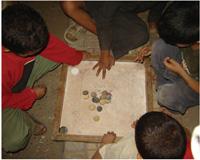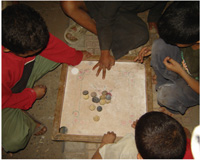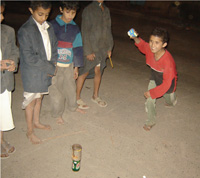
Yemeni traditional games: Remembering our childhood [Archives:2007/1099/Last Page]
November 1 2007
 |
 |
[email protected]
Traditional Yemeni children's games are many, but some have disappeared while others remain popular. These various types of traditional games will be presenting in a series.
Many games have existed for a very long time and still are played today in many cultures around the world. These games are a common factor cutting across many cultures and ignoring linguistic, religious or societal boundaries.
Yemeni children's games can be divided into different types according to gender, age, environment, the players' culture, etc. For example, some games are classified as either boys' games or girls' games.
As child psychology professor Najat Sa'em explains, “Children themselves act out the roles of their parents or community; thus, we see girls acting like mothers, while boys mostly behave as men or fathers.”
It's common for boys to refuse to let girls play with them and this is because some Yemeni cultural norms play a role in such division and differences. For example, it's rare to see boys and girls playing together, especially after a certain age, due to the nature of Yemeni culture, which forbids boys and girls from playing together, especially after puberty.
Some boys' games are violent or require much effort to play. In doing them, boys are proud of their strength and the fact that they are stronger than girls. The nature of boys' games is competition distinguished by winner and loser. “Such distinction is related to boys' skills and thinking and this reflects the psychological nature of boys playing such games,” Sa'em clarifies.
She adds that it's easy for observers to see what type of character a child has through his or her play and how he or she interacts with fellow players.
Professor Sa'em announced that a new section will be established next year at Sana'a University to teach early childhood development through games. Teaching children's games and creative activities will be the diploma's basic subject, in addition to three other subjects focusing on observing child growth and development. “The diploma's aim is to study child behavior from infancy to age 8,” she notes.
The main focus of such diploma is to study the relationship between child growth and play specifically, Sa'em says, adding that there's also a plan to establish a new games library specializing in childhood in the Yemeni community.
Games are divided according to children's skills and abilities and such games seek to develop their skills. There are also games that create a social atmosphere among children, which allows them to integrate and interact with their society. “Games and playing are children's way of entering life around them,” Sa'em explains.
In countries around the world, children love playing games with balls. In doing so, they learn to handle the ball in different ways and develop special skills while having a lot of fun in the process.
Sociologists point out that games are the life of children, just as work is important to adults. The game a child is interested in and spends most of his or her time playing can be a hint of his or her future career. Games are the dividing line between childhood and manhood.
The nature of children's games doesn't mean players must win or lose in all matters or games. Children's games have special rules for each game and it's sometimes difficult to determine how such play will progress or who, if anyone, will win.
Some games depend on competition, with each team fighting to be better than the others, but in most cases, winning or losing is related to either a child's skills or pure luck.
In a paper on Adeni folklore, Ahmad Al-Sa'eed explained that there are some aspects that all traditional children's games share. These are in the spirit of folklore such as the game's ancientness, popularity, simplicity, rationality and its ability to survive over a long time with few changes, in addition to unknown authorship of specific songs or games.
Children's games are special in many aspects because children have their own world and atmosphere and use their own words and expressions.
Subsequent parts of this series will feature specific Yemeni children's games, both those for boys and for girls.
——
[archive-e:1099-v:15-y:2007-d:2007-11-01-p:lastpage]


